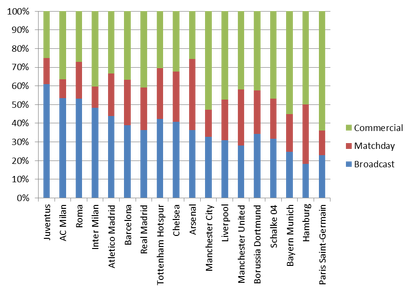
It might seem strange to have the Italian clubs lead the list because, with the exception of Juventus, they are sliding down the DFML. Of course, the importance of broadcasting could also represent the relative importance of the other income streams. For example, the small matchday revenues (possibly attributed to stadium ownership) for Italian clubs makes the broadcast revenues seem more important. While Juventus have the highest proportion of their revenue from broadcasting, the amount they actually receive (€166m) is less than Real Madrid (€188.3) and Barcelona (€188.2m). The DFML report notes that 2013 was an unusually good year for Juventus in terms of broadcasting. Despite "only advancing to the quarter-finals of the Champions League, Juventus received the highest distribution (€65.3m) of any club in the competition". The €166m Juventus received in broadcasting revenues in 2013 was a 77% increase on 2012.
For the last number of seasons the Italian clubs have moved to collective selling of broadcast rights (reversing an 1999 anti-trust ruling in the Italian Courts). In the case of the Italian clubs the key issue is the distribution of the broadcast rights. Ed Thompson has a superb explanation of how the Italian clubs distribute the revenues (here). It is a system that heavily favours the status-quo and bigger clubs. Juventus in particular is a big winner under the Italian system.
The Spanish clubs sell the domestic broadcast rights to their games individually. This results in Real Madrid and Barcelona getting a larger share of that pie. Last year The Guardian reported (here) that Real Madrid received €140m while Granada received only €12m. Although Barcelona exited the Champions League at the same stage as in 2012 they received an increase in broadcast revenue from that source.
German clubs benefitted from a new international right deal for the Bundesliga. Two of the four in the above table also benefitted from getting to the Champions League final. Although they lost the final, Borussia Dortmund were the biggest winner in terms of the increase in broadcast revenues (45%). Chelsea's return from Europe went in the opposite direction. However, this was offset by an increase in revenue from the Premier League. There was also modest increases for the other Premier League clubs.
The importance of a good run in Europe's premier competition is best illustrated by Paris Saint-Germain. Their broadcast revenue grew by a massive 93% as a result of reaching the Champions League quarter-finals whereas the previous year they were eliminated at the group stage of the Europa League. Failure to qualify from one's domestic league can be seriously costly in terms of broadcast revenues.
 RSS Feed
RSS Feed